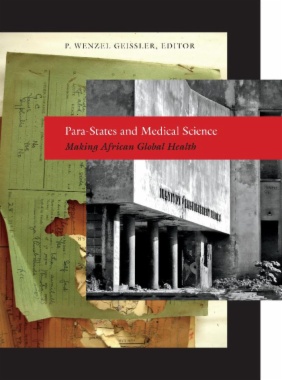In Para-States and Medical Science, P. Wenzel Geissler and the contributors examine how medicine and public health in Africa have been transformed as a result of economic and political liberalization and globalization, intertwined with epidemiological and technological changes. The resulting fragmented medical science landscape is shaped and sustained by transnational flows of expertise and resources. NGOs, universities, pharmaceutical companies and other nonstate actors now play a significant role in medical research and treatment. But as the contributors to this volume argue, these groups have not supplanted the primacy of the nation-state in Africa. Although not necessarily stable or responsive, national governments remain crucial in medical care, both as employers of health care professionals and as sources of regulation, access, and – albeit sometimes counterintuitively - trust for their people. “The state” has morphed into the “para-state” — not a monolithic and predictable source of sovereignty and governance, but a shifting, and at times ephemeral, figure. Tracing the emergence of the “global health” paradigm in Africa in the treatment of HIV, malaria, and leprosy, this book challenges familiar notions of African statehood as weak or illegitimate by elaborating complex new frameworks of governmentality that can be simultaneously functioning and dysfunctional.
Contributors. Uli Beisel, Didier Fassin, P. Wenzel Geissler, Rene Gerrets, Ann Kelly, Guillaume Lachenal, John Manton, Lotte Meinert, Vinh-Kim Nguyen, Branwyn Poleykett, Susan Reynolds Whyte
- Contents
- Introduction: A Life Science in Its African Para-State (P. Wenzel Geissler)
- Part I: Rupture, Continuity
- Chapter 1. Treating to Prevent HIV: Population Trials and Experimental Societies (Vinh-Kim Nguyen)
- Chapter 2. Trialing Drugs, Creating Publics: Medical Research, Leprosy Control, and the Construction of a Public Health Sphere in Post-1945 Nigeria (John Manton)
- Part II: Pasts, Futures
- Chapter 3. Lessons in Medical Nihilism: Virus Hunters, Neoliberalism, and the AIDS Pandemic in Cameroon (Guillaume Lachenal)
- Chapter 4. What Future Remains? Remembering an African Place of Science (P. Wenzel Geissler)
- Part III: State Remains
- Chapter 5. International Health and the Proliferation of “Partnerships” : (Un)Intended Boost for State Institutions in Tanzania? (Rene Gerrets)
- Chapter 6. Working and Surviving: Government Employees on ART in Uganda (Susan Reynolds Whyte)
- Part IV: Affective Wholes
- Chapter 7. Molecular and Municipal Politics: Research and Regulation in Dakar (Branwyn Poleykett)
- Chapter 8. The Work of the Virus: Cutting and Creating Relations in an ART Project (Lotte Meinert)
- Part V: Struggling Nation
- Chapter 9. The Blue Warriors: Ecology, Participation, and Public Health in Malaria Control Experiments (Uli Beisel)
- Chapter 10. The Territory of Medical Research: Experimentation in Africa’s Smallest State (Ann H. Kelly)
- Chapter 11. Adventures of African Nevirapine: The Political Biography of a Magic Bullet (Didier Fassin)
- Contributors
- Index

